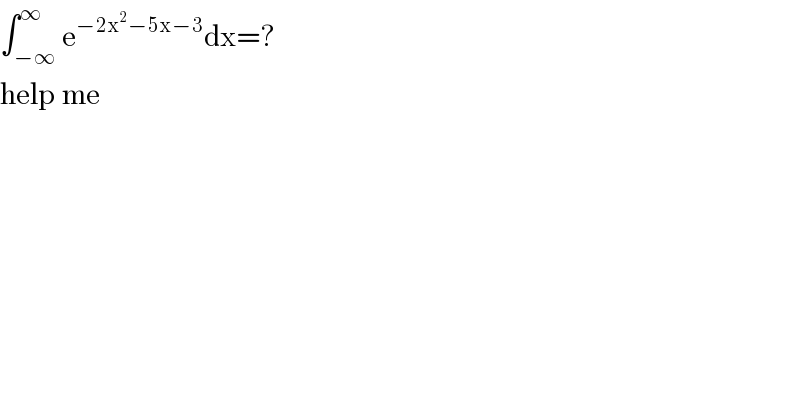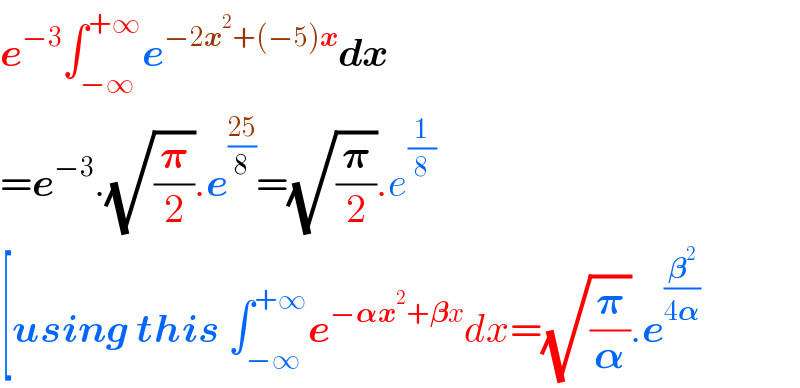
Question Number 99541 by student work last updated on 21/Jun/20

$$\int_{−\infty} ^{\infty} \mathrm{e}^{−\mathrm{2x}^{\mathrm{2}} −\mathrm{5x}−\mathrm{3}} \mathrm{dx}=?\: \\ $$$$\mathrm{help}\:\mathrm{me} \\ $$
Answered by smridha last updated on 21/Jun/20

$$\boldsymbol{{e}}^{−\mathrm{3}} \int_{−\infty} ^{+\infty} \boldsymbol{{e}}^{−\mathrm{2}\boldsymbol{{x}}^{\mathrm{2}} +\left(−\mathrm{5}\right)\boldsymbol{{x}}} \boldsymbol{{dx}} \\ $$$$=\boldsymbol{{e}}^{−\mathrm{3}} .\sqrt{\frac{\boldsymbol{\pi}}{\mathrm{2}}}.\boldsymbol{{e}}^{\frac{\mathrm{25}}{\mathrm{8}}} =\sqrt{\frac{\boldsymbol{\pi}}{\mathrm{2}}}.{e}^{\frac{\mathrm{1}}{\mathrm{8}}} \\ $$$$\left[\boldsymbol{{using}}\:\boldsymbol{{this}}\:\int_{−\infty} ^{+\infty} \boldsymbol{{e}}^{−\boldsymbol{\alpha{x}}^{\mathrm{2}} +\boldsymbol{\beta}{x}} {dx}=\sqrt{\frac{\boldsymbol{\pi}}{\boldsymbol{\alpha}}}.\boldsymbol{{e}}^{\frac{\boldsymbol{\beta}^{\mathrm{2}} }{\mathrm{4}\boldsymbol{\alpha}}} \:\right. \\ $$
Commented by student work last updated on 21/Jun/20

$$\mathrm{thanks}\:\mathrm{sir}\:\mathrm{good} \\ $$
Commented by smridha last updated on 21/Jun/20
welcome
Answered by aleks041103 last updated on 21/Jun/20

$${I}=\int_{−\infty} ^{\infty} \mathrm{e}^{−\mathrm{2x}^{\mathrm{2}} −\mathrm{5x}−\mathrm{3}} \mathrm{dx}= \\ $$$$=\int_{−\infty} ^{\infty} \mathrm{e}^{−\left(\mathrm{2x}^{\mathrm{2}} +\mathrm{5x}+\mathrm{3}\right)} \mathrm{dx} \\ $$$${We}\:{complete}\:{the}\:{square}: \\ $$$$\mathrm{2}{x}^{\mathrm{2}} +\mathrm{5}{x}+\mathrm{3}= \\ $$$$=\left(\sqrt{\mathrm{2}}{x}\right)^{\mathrm{2}} +\mathrm{2}\left(\sqrt{\mathrm{2}}{x}\right)\frac{\mathrm{5}}{\mathrm{2}\sqrt{\mathrm{2}}}+\left(\frac{\mathrm{5}}{\mathrm{2}\sqrt{\mathrm{2}}}\right)^{\mathrm{2}} −\left(\frac{\mathrm{5}}{\mathrm{2}\sqrt{\mathrm{2}}}\right)^{\mathrm{2}} +\mathrm{3}= \\ $$$$=\left(\sqrt{\mathrm{2}}{x}+\frac{\mathrm{5}}{\mathrm{2}\sqrt{\mathrm{2}}}\right)^{\mathrm{2}} +\mathrm{3}−\frac{\mathrm{25}}{\mathrm{8}}= \\ $$$$=\left(\sqrt{\mathrm{2}}{x}+\frac{\mathrm{5}}{\mathrm{2}\sqrt{\mathrm{2}}}\right)^{\mathrm{2}} −\frac{\mathrm{1}}{\mathrm{8}} \\ $$$${Let} \\ $$$${u}=\sqrt{\mathrm{2}}{x}+\frac{\mathrm{5}}{\mathrm{2}\sqrt{\mathrm{2}}}\:\Rightarrow{du}=\sqrt{\mathrm{2}}\:{dx}\:\Rightarrow\:{dx}=\frac{{du}}{\sqrt{\mathrm{2}}} \\ $$$${Also}\: \\ $$$${x}\rightarrow+\infty\:\Rightarrow\:{u}\rightarrow+\infty \\ $$$${x}\rightarrow−\infty\:\Rightarrow\:{u}\rightarrow−\infty \\ $$$${Then} \\ $$$${I}=\int_{−\infty} ^{+\infty} {e}^{−\left({u}^{\mathrm{2}} −\mathrm{1}/\mathrm{8}\right)} \frac{{du}}{\sqrt{\mathrm{2}}}=\frac{{e}^{\mathrm{1}/\mathrm{8}} }{\sqrt{\mathrm{2}}}\int_{−\infty} ^{+\infty} {e}^{−{u}^{\mathrm{2}} } {du} \\ $$$${But}\:\int_{−\infty} ^{+\infty} {e}^{−{u}^{\mathrm{2}} } {du}=\sqrt{\pi}\:{is}\:{the}\:{gaussian} \\ $$$${integral}.\:{Then}\:{for}\:{I}\:{we}\:{have}: \\ $$$${I}={e}^{\mathrm{1}/\mathrm{8}} \sqrt{\frac{\pi}{\mathrm{2}}} \\ $$$${Or}: \\ $$$${I}=\int_{−\infty} ^{\infty} \mathrm{e}^{−\mathrm{2x}^{\mathrm{2}} −\mathrm{5x}−\mathrm{3}} \mathrm{dx}={e}^{\mathrm{1}/\mathrm{8}} \sqrt{\frac{\pi}{\mathrm{2}}} \\ $$
Commented by student work last updated on 21/Jun/20

$$\mathrm{thanks}\:\mathrm{sir} \\ $$
Answered by mathmax by abdo last updated on 21/Jun/20

$$\mathrm{I}\:=\int_{−\infty} ^{+\infty} \:\mathrm{e}^{−\mathrm{2x}^{\mathrm{2}} −\mathrm{5x}−\mathrm{3}} \mathrm{dx}\:\Rightarrow\:\mathrm{I}\:=\int_{−\infty} ^{+\infty} \:\mathrm{e}^{−\mathrm{2}\left\{\:\mathrm{x}^{\mathrm{2}} +\frac{\mathrm{5}}{\mathrm{2}}\mathrm{x}+\frac{\mathrm{3}}{\mathrm{2}}\right\}} \:\mathrm{dx} \\ $$$$=\int_{−\infty} ^{+\infty} \:\mathrm{e}^{−\mathrm{2}\left\{\:\mathrm{x}^{\mathrm{2}} \:+\mathrm{2}.\frac{\mathrm{5}}{\mathrm{4}}\mathrm{x}\:+\frac{\mathrm{25}}{\mathrm{16}}+\frac{\mathrm{3}}{\mathrm{2}}−\frac{\mathrm{25}}{\mathrm{16}}\right\}} \mathrm{dx}\:=\int_{−\infty} ^{+\infty\:} \mathrm{e}^{−\mathrm{2}\left\{\left(\mathrm{x}+\frac{\mathrm{5}}{\mathrm{4}}\right)^{\mathrm{2}} \:−\frac{\mathrm{1}}{\mathrm{16}}\right\}} \mathrm{dx}\:\:\left(\mathrm{x}+\frac{\mathrm{5}}{\mathrm{4}}\right)\sqrt{\mathrm{2}}=\mathrm{u} \\ $$$$=\mathrm{e}^{\frac{\mathrm{1}}{\mathrm{8}}} \:\int_{−\infty} ^{+\infty} \:\:\mathrm{e}^{−\mathrm{u}^{\mathrm{2}} } \:\frac{\mathrm{du}}{\sqrt{\mathrm{2}}}\:=\frac{\mathrm{e}^{\frac{\mathrm{1}}{\mathrm{8}}} }{\sqrt{\mathrm{2}}}×\sqrt{\pi}\:\Rightarrow\mathrm{I}\:=^{\mathrm{8}} \sqrt{\mathrm{e}}×\sqrt{\frac{\pi}{\mathrm{2}}} \\ $$
